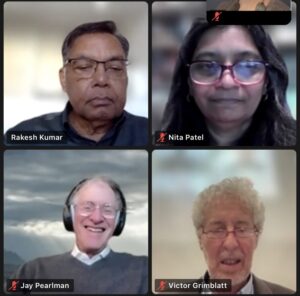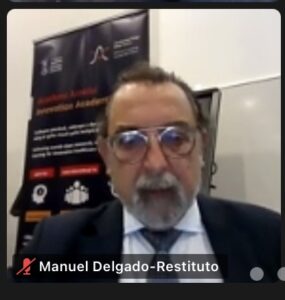 Luis Kun
Luis Kun The first of two Climate Change Panels at this year’s 2023 IEEE International Symposium on Technology and Society (ISTAS) was held September 13 in Swansea, Wales, U.K. Moderated by IEEE SSIT President Luis Kun, the panel, “IEEE Societies: Addressing Climate Change Challenges,” aimed to highlight varied efforts among IEEE technical societies to confront climate change issues.
Kun noted that while many entities within IEEE are working to address climate change challenges, sometimes within IEEE “the right hand doesn’t know what the left hand is doing.” The panel was partly an effort to promote communication and discussion among some of the IEEE groups working on the climate change crisis.
Some topics addressed during the panel discussion included climate change challenges related to health and healthcare, contributions of computing to the climate change problem in terms of energy use, along with the potential of computing to contribute to solutions to the crisis, agriculture and food security issues related to climate change, systems design, finding solutions and improving communication across IEEE societies, carbon removal, and economic and social aspects of the crisis including forced migration, water supplies, and the responsibilities of developed nations to developing nations in climate change mitigation.
Metin Akay, past president of the IEEE Society on Engineering, Medicine and Biology (EMBS), the first speaker, noted that the young and elderly are most vulnerable to negative health impacts of climate change, including from high temperature extremes, flooding, and reduced air quality such as from smoke from fires. He noted increases in respiratory and cardiovascular disease and increased deaths, and an increase in chronic diseases in general, all putting intense pressure on health care systems, added to increases in water-borne diseases and infectious diseases through airborne vectors. Some of the impacts are and will be catastrophic in terms of health, especially related to food and water security. Important efforts to improve the ability of humans to cope with climate change need to include improvements in early warning systems and infrastructure. Akay also noted that mental health issues are one of the biggest health impacts of the crisis.
 Metin Akay
Metin Akay
Finally Akay called on industry, engineers, and policy makers to do more to reduce energy use in the health care industry, where technologies like MRI use vast amounts of energy and should be made more efficient, including through the use of AI and machine learning.
Nita Patel, President of the IEEE Computer Society, noted possible solutions such as “digital twins” to be used in the fight against climate change, and to help “create a more adaptable and efficient infrastructure. (According to an IBM webpage, “a digital twin is a virtual representation of an object that spans its lifecycle, is updated from real-time data, and uses simulation, machine learning, and reasoning to help decision making.”) Patel advocated “taking a systems view of climate,” including incorporating quantum computing.
Manuel Delgado-Restituto, President of the IEEE Circuits and Systems Society said individual IEEE members and societies are more and more aware of the urgency of addressing climate change issues. He recommended efforts be made to reduce the climate impacts of agriculture, and also noted issues of food security related to climate change. He noted the challenges of dealing with climate change given that it is a “socio-economic problem,” but our economic model is about “making money.”

Victor Grimblatt, also of the Circuits and Systems Society, and co-author of an IEEE White Paper on climate change, advocated a big picture, systems approach to design in the fight to mitigate climate change. He called for greater communication and interface between policy makers and stakeholders, and using digital technologies to improve efficiencies.
Finally, Rakesh Kumar, past president of the IEEE Solid-State Circuits Society talked about the importance of finding solutions across technical societies. “IEEE has 39 centers of technical excellence,” he said, referring to the individual Technical Societies, and said there needs to be “better communication and understanding” among the groups, especially in efforts to create solutions to climate change issues. He suggested looking for ways to mitigate the impact of data centers, noting that if current trends continue, in a few years 15% of global energy consumption will be be devoted to data centers.
As engineers, “we want to solve the world’s problems,” Kumar said. But “we can’t do everything. So we need to pick and choose what we can contribute.” Kumar noted current issues like the lack of infrastructure for charging electric vehicles, noting that he had recently purchased an electric vehicle with a 300-mile range, and taken it on a trip. When he arrived at his destination, he said he had to “really scramble” to find a way to charge the car.
Questions from the in-person and virtual audience for the panel included from Jay Pearlman, SSIT VP for Conferences, who asked Nita Patel via chat, “Digital twins can be a powerful tool. They also require a lot of computer and other resources. How can DT be created and used in developing regions of the world?” Patel responded: “Jay – good point. I think digital twins may not easily be created in developing regions, but should provide value for developing regions. That is, the point of the digital twin is to be able to adapt and help us adjust algorithms, settings, options to optimize the full solution. As a result, I don’t see why we can’t create DTs that emulate the challenges and then make adjustments to find solutions. The challenge is, of course, it’s an investment of time, resources, interest, and runs into the age-old problem of where do we prioritize.”
Another, in-person, audience member asked the panel to discuss more about the social aspects of climate change. In response, SSIT President Luis Kun noted that a million people are being added to the Earth’s population every four days. That this is also contributing to the pressures on food and water security. At the same time, glaciers, which have been a source of clean drinking water for much of the globe, are melting. These issues are causing forced migration where people are forced into contact with other groups with different religions and cultures.
Victor Grimblatt added that solutions are going to require people to “change the way we do things and the way we live.” He noted that meat production for food is the biggest agricultural contributor to greenhouse gas emissions – and that rice production is the second biggest contributor. But he said, we are not expecting people to stop eating rice or meat. Instead he said we have to find better ways to produce those foods that do not harm the planet.
A second ISTAS 2023 Climate Change panel, this one titled “Public Safety Technologies and Climate Change,” took place Thursday, September 14.
-Terri Bookman






 JOIN SSIT
JOIN SSIT